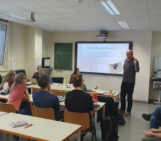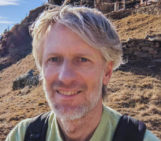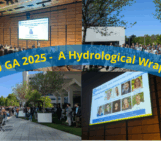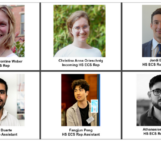
Christina Orieschnig is a hydrologist at IRD in the South of France. She is also the Early Career Scientist representative for the EGU Hydrological Sciences division.
Can you tell us about the focus of your research? What have you done so far and what are you doing next?
I completed my PhD at AgroParisTech in 2022. My research focused on building an eco-hydrological model in the Mekong Delta in Cambodia that also considered farmer decision making. Now, I’m a research engineer at the French National Institute for Sustainable Development (IRD) where I focus on combining remote sensing and in situ data. Within the EGU, I’m the vocal for the Outreach and Communication working group. In the International Association of Hydrological Sciences (IAHS), I’m organizing a working group to look at how science communication can be used to achieve the objectives of their new scientific decade, HELPING.

Christina in the field in Cambodia, interviewing farmers about water usage.
What originally inspired you to go into this field?
When I was growing up in Austria, my dad was a bit of an environmental activist working on one of the first river remediation programs in Europe. In the valley where we lived, the Drava River was highly regulated in the 19th and 20th century, which led to negative ecological consequences, such as ground water lowering and a loss of biodiversity. My dad was a biology teacher at our local middle school and was very active in the efforts to restore the river, and that’s what originally got me interested in hydrology.
Looking back, what was the most challenging aspect of your PhD and what was the most rewarding?
The most challenging aspect of my PhD was the pandemic. Most people in our field who did their PhD during that time have similar stories, so I’m not alone in that. In February 2020, I flew over to my field site in Cambodia with an intern to start my field work. Then, after Covid began spreading, we had to drop everything and go back to Europe. I managed to catch the last plane back to Vienna. It was surreal to suddenly be back on a farm in Austria, video calling my supervisors to figure out how to do carry on with my thesis.
The most rewarding aspect of my PhD was becoming a part of the international hydrological community, especially through the EGU and IAHS. Just connecting with so many researchers from different corners of the world has been fantastic.
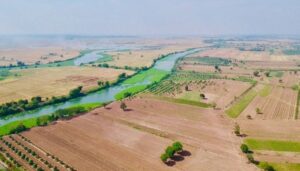
Field site in Cambodia in the dry season
What were the biggest challenges in your post-PhD life?
In 2022 I taught for a year and a half at the University of Montpellier. But I was asked to teach an introductory course in mathematics and I didn’t know any of the vocabulary and French mathematics is very different to the mathematics I had learnt! I had a lot of long discussions with the other professor teaching it, but that was a pretty big challenge for me. I managed in the end!
What is the main challenge that you think most young researchers encounter?
The pressure to publish has been getting worse and worse and worse. As soon as you start your PhD you’ve got this immense pressure to think that whatever you do, is there a potential paper?
After your PhD there are very high expectations in terms of academic mobility. It’s considered completely normal to move around a lot during your postdoc years before you can manage to get a permanent position. I’m someone who likes to put down roots, so I’m very lucky that I managed to find a steady job very quickly.
Why did you decide to become an Early Career Scientist Representative?
When I was doing my MSc in Vienna, I knew about the EGU in an abstract sense because a lot of our lecturers would vanish for a week in April or May to attend it. When I went in 2022 it was so inspiring to connect and talk to people and get the sense that I’m not doing my research in my own little bubble. I started as a blog editor, then when I saw that the ECS position was open, I decided to give it a shot because our previous reps were both fantastic.
What do you like about the role?
Getting to know people in a professional capacity, but not solely for research purposes. It’s also been rewarding to help the ECS in the EGU community with short courses at the GA or through the webinars that we do.
What advice would you give to other early career scientists?
Find a time management system that works for you. There are lots of advice articles and books out there – and I read many of them when I first started. In the end, though, you’ll have to figure out what works best for your unique needs.
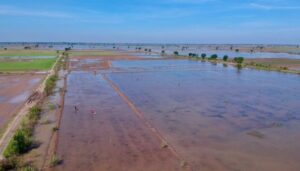
Field site in Cambodia during the wet season

